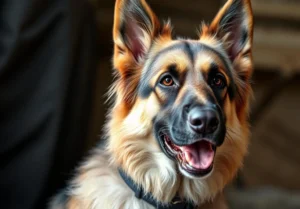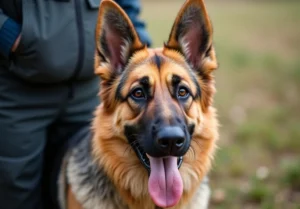Disclosure: We may earn a commission from helpful, relevant links in our content. No cost to you. See our privacy policy.
Finding the perfect canine companion for your living situation can be tricky. If you’re wondering whether German Shepherds make good indoor dogs, you’ve come to the right place.
We’ll provide you with helpful tips and insights to ensure that your German Shepherd thrives indoors, making your home a haven for both of you.
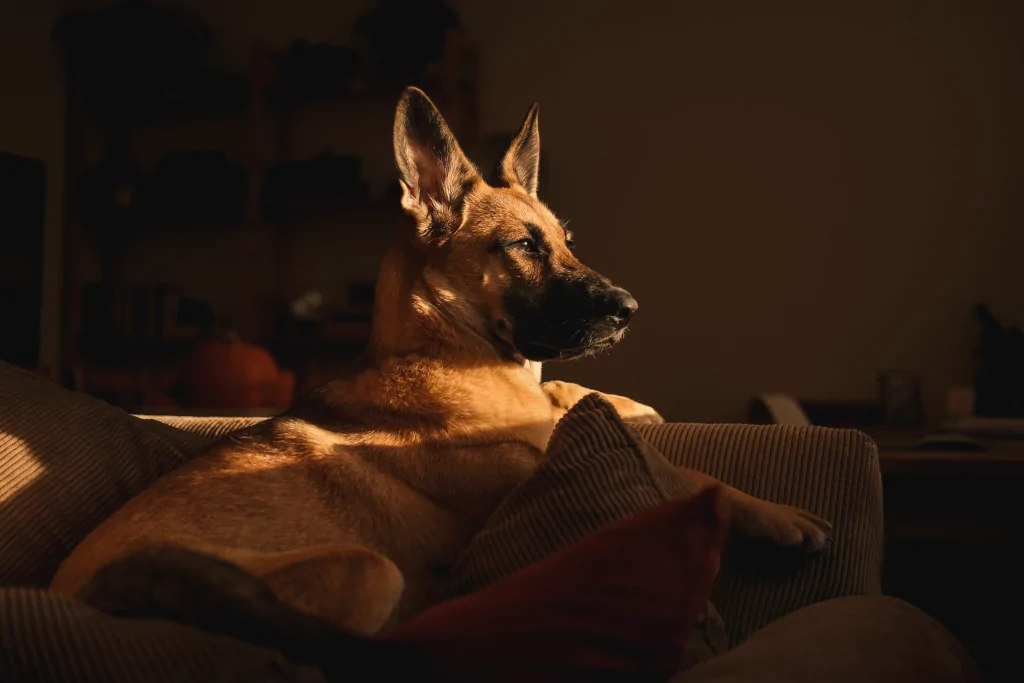
What Makes a German Shepherd a Good Indoor Dog?
German Shepherds are known for their intelligence, loyalty, and eagerness to please their owners. These traits make them highly trainable, which is essential for adapting to indoor living.
Their protective instincts make them excellent watchdogs, ensuring the safety of your home and family.
With the right training, socialization, and care, a German Shepherd can become a well-mannered and loving member of your indoor family.
How Much Space and Exercise Do They Need?
German Shepherds are large, active dogs that need regular exercise to stay healthy and happy.
They require at least 1 to 2 hours of physical activity daily, including walks, playtime, and training sessions. A fenced yard is ideal for them to run and play, but if that’s not an option, daily walks and trips to a nearby dog park can help meet their exercise needs.
To accommodate a German Shepherd indoors, provide a dedicated space for them to sleep and play. Ensure there’s enough room for them to move around comfortably without bumping into furniture or knocking over items.
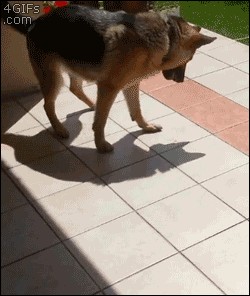
Can They Adapt to Apartment Living?
While German Shepherds are large dogs, they can adapt to apartment living if their needs are met through proper care, exercise, and mental stimulation. Here are a few essential tips to help your German Shepherd thrive in an apartment setting:
- Daily exercise. Ensure your dog gets enough daily exercise through walks, playtime, and training sessions. Long walks and regular trips to a dog park can help them burn off energy and stay healthy.
- Mental stimulation. Keep your German Shepherd mentally engaged with puzzle toys, obedience training, and scent work. Boredom can lead to destructive behavior, so keeping their mind busy is crucial.
- Noise management. Teach your dog to be less vocal indoors by using positive reinforcement training. Reward them for being quiet and redirect their attention when they bark unnecessarily. We also have a guide to reduce barking in dogs which we highly recommend.
- Socialization. Expose your German Shepherd to different people, animals, and environments to help them become well-rounded and comfortable with various situations. To learn all about how to socialize your dog, check out our dog socialization guide.
- Space optimization. Create designated areas for your dog’s bed, toys, and feeding station, making it clear where they can and cannot go. Use baby gates or playpens to limit access to certain areas if needed.
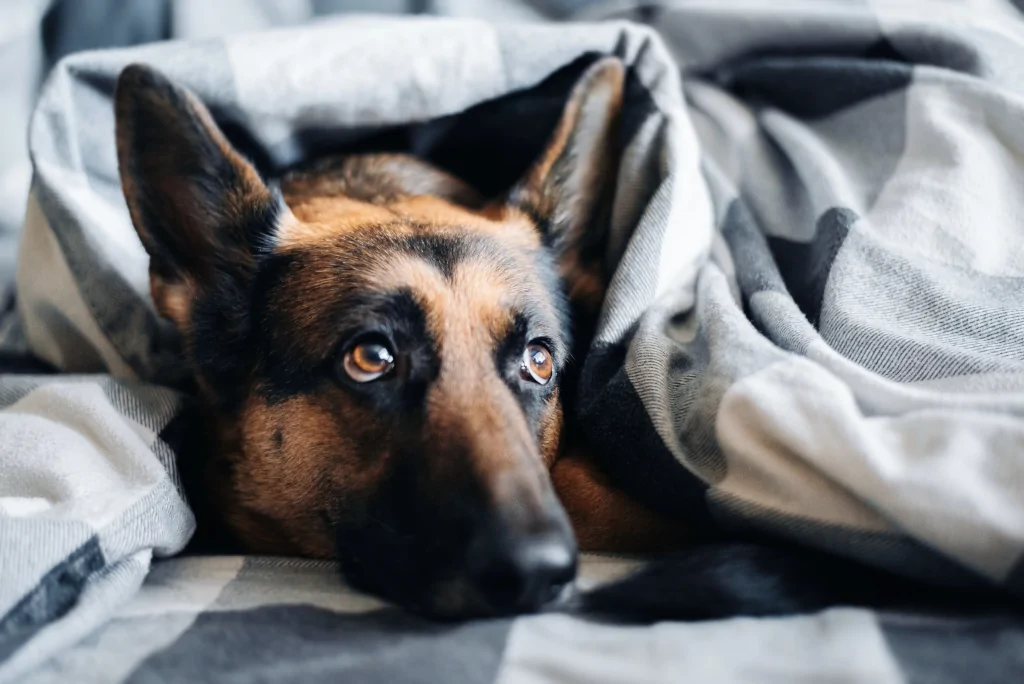
Tips for Creating a Comfortable Indoor Environment
To ensure your German Shepherd feels at home in your living space, consider the following tips for creating a comfortable indoor environment:
- Comfortable bedding
Provide a comfortable, supportive bed that is large enough for your German Shepherd to stretch out and relax.
A good comfortable, and supportive bed for a German Shepherd is the Big Barker Orthopedic Dog Bed. It is specifically designed for large breeds and provides excellent support and comfort.
- Temperature control
Maintain a comfortable indoor temperature for your dog, as they can be sensitive to heat. Ensure proper ventilation and use fans or air conditioning during hot weather.
A good indoor temperature for a German Shepherd is between 68°F (20°C) and 72°F (22°C). This range should keep them comfortable without causing overheating or excessive cold.
- Flooring
Provide non-slip surfaces, such as rugs or mats, to help your dog feel secure and prevent them from slipping on hardwood or tile floors.
To provide non-slip surfaces for your German Shepherd, consider using the Gorilla Grip Original Area Rug Gripper Pad or the BarksBar Non-Slip Pet Feeding Mat to prevent slipping on hardwood or tile floors.
- Dog-friendly furniture
If you allow your German Shepherd on the furniture, go for quality leather, as poor bonded leather quality may not hold up. If you can, invest in washable, durable covers to protect your belongings and make cleaning up easier.
For protecting your furniture, this Sofa Shield Slipcover is a durable and washable option that can help keep your belongings clean and well-maintained.
- Chewing outlets
Offer a variety of safe and durable chew toys to help your dog satisfy their natural urge to chew and prevent them from chewing on household items.
A durable chew toy suitable for a German Shepherd is the KONG Extreme Dog Toy. It’s made from a tough rubber material that can withstand strong chewers and can be filled with treats for added mental stimulation.
To train your dog not to chew, visit our guide here that will help you understand why dogs chew, and how to stop it with some easy training.
Set up an indoor play area with interactive toys and activities to keep your German Shepherd engaged and entertained when they’re inside.
By following these tips and providing your German Shepherd with the care they need, you can create a comfortable and enjoyable indoor environment for your furry friend.
How to Keep Your German Shepherd Happy and Healthy Indoors
Keeping your German Shepherd happy and healthy indoors involves a combination of physical exercise, mental stimulation, and a balanced diet.
Develop a consistent daily routine that includes walks, playtime, and training sessions tailored to your dog’s energy levels and interests.
Prioritize obedience and socialization training to ensure your dog remains well-behaved and adapts to various situations. We also suggest potty training your dog in their early puppy-days.
Lastly, consult your veterinarian to determine the appropriate diet and portion sizes for your dog’s age, weight, and activity level, as proper nutrition is vital to their overall health and well-being.
Suggested read: Top Housebreaking and Potty training tools
FAQs
How much exercise do German Shepherds need daily?
German Shepherds typically require at least 1 to 2 hours of exercise daily, including walks, playtime, and mentally stimulating activities such as training or puzzle toys.
Are German Shepherds more prone to separation anxiety?
German Shepherds can develop separation anxiety if not properly socialized and accustomed to being alone for short periods. Consistent training and gradually increasing alone time can help prevent and manage this issue.
We have a guide for separation anxiety here that can help you ease your dog’s mental issues, and turn them into a happy, thriving pet.
Can German Shepherds be trained to be less vocal indoors?
Yes, German Shepherds can be trained to be less vocal indoors using positive reinforcement techniques, rewarding quiet behavior, and redirecting their attention when they bark unnecessarily.
What type of toys and activities do German Shepherds enjoy?
German Shepherds enjoy a variety of toys and activities, including puzzle toys, fetch, tug-of-war, scent work, and obedience training. Providing a mix of activities will help keep them engaged and mentally stimulated.
Alex, a passionate animal lover, has experience in training and understanding animal behavior. As a proud pet parent to two dogs and three cats, he founded AnimalReport.net to share insights from animal experts and expand his knowledge of the animal kingdom.


